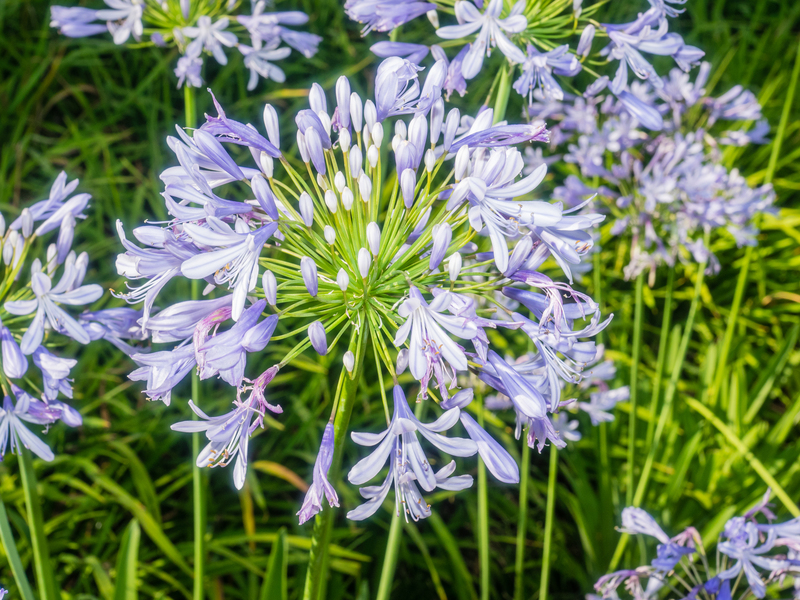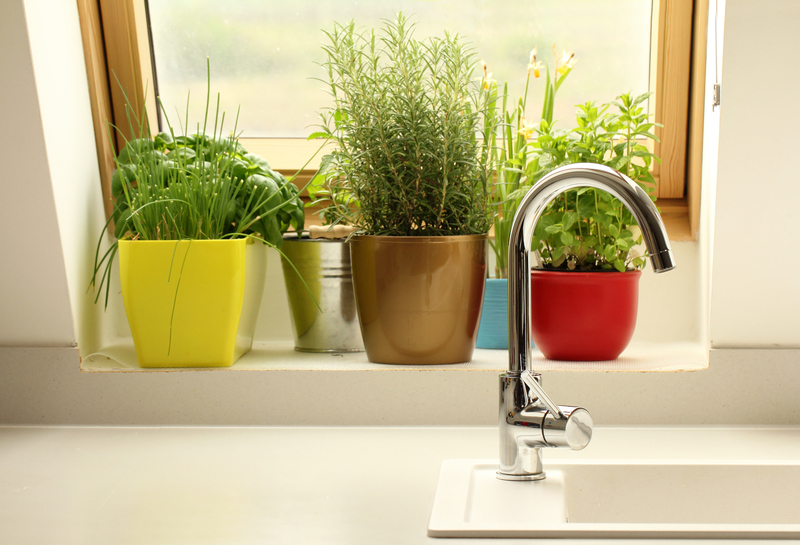Embark on Your Gardening Adventure: 9 Tips for the Uninitiated
Posted on 08/09/2025
Embark on Your Gardening Adventure: 9 Tips for the Uninitiated
Are you longing to create a tranquil oasis or a lush kitchen garden in your backyard, yet find yourself unsure where to start? Beginning your gardening adventure can seem daunting, especially for newcomers. But with the right guidance and a sprinkle of enthusiasm, cultivating your own green paradise is more accessible and rewarding than you may think.
This comprehensive guide outlines nine practical gardening tips for beginners. Whether you're dreaming of a vibrant flowerbed, a thriving vegetable patch, or a collection of beautiful indoor plants, these time-tested strategies will set you on a path to gardening success. Let's dive into the world of planting, nurturing, and reaping the rewards of your very own gardening journey!
1. Start Small and Set Realistic Goals
One of the most common mistakes for new gardeners is aiming too high from the start. A large garden may sound appealing, but it can quickly become overwhelming, leading to frustration or neglect. Instead, begin your gardening adventure with a manageable plot or a few containers. This allows you to learn the ropes and savor early victories.
- Consider starting with a 4x4 foot raised bed, a window box, or a group of pots on your patio.
- Choose a handful of easy-to-grow plants such as lettuce, basil, marigolds, or zinnias.
- Set simple goals--successfully grow one vegetable or keep three houseplants healthy for a season.
Tip: It's better to have a small, well-tended garden than a sprawling plot that's difficult to control!

2. Get to Know Your Climate and Soil
Your local environment is the foundation of gardening success. Before planting anything, research your USDA hardiness zone or local climate profile. This determines which plants will flourish in your area.
- Use online resources or consult your local garden center to identify your plant hardiness zone.
- Get a soil test kit to check for pH and nutrient levels. Healthy soil is the bedrock of every productive garden.
- Amend your soil with organic matter such as compost for improved fertility and structure.
Knowing your soil type and climate helps you choose the best plants for your unique gardening journey.
3. Choose the Right Plants for Beginners
If you're new to gardening, it's wise to select plants noted for their resilience and ease of care. Some varieties are famous for thriving with minimal attention, making them excellent choices for beginners embarking on their first horticultural adventure.
- Vegetables: Radishes, lettuce, spinach, beans, and tomatoes are reliable and quick to mature.
- Herbs: Basil, chives, oregano, and mint are forgiving and grow well in pots or garden beds.
- Flowers: Consider zinnias, sunflowers, pansies, marigolds, and nasturtiums for long-lasting color.
- Houseplants: Snake plant, pothos, and spider plant are tough, beautiful, and low-maintenance.
Selecting the right plants adds joy and ensures quick rewards on your gardening adventure!
4. Master the Art of Watering
Proper watering is fundamental--but often misunderstood--when starting your gardening journey. Overwatering is just as harmful as under-watering. Plants have individual needs depending on their species, climate, and container size.
- Check the soil moisture before watering by sticking your finger an inch deep; if it feels dry, it's time to water.
- Water deeply rather than frequently to promote strong root development.
- Morning is the best time to water, minimizing evaporation and helping prevent disease.
- Use mulch such as straw, wood chips, or compost to help retain moisture and suppress weeds.
*Well-tuned watering habits are critical for every aspiring gardener.*
5. Understand Sunlight Requirements
Plants rely on sunlight for photosynthesis, growth, and blooming. Before planting, observe your chosen spot throughout the day. Does it receive full sun (6+ hours), part shade, or full shade?
- Most fruiting vegetables and many flowers need full sun.
- Leafy greens, ferns, and some annuals thrive in partial shade.
- Match plant selection with the available sunlight for best results.
Planning your garden layout based on sun exposure will dramatically increase your chances of success.
6. Equip Yourself with the Basics
A seasoned gardener's toolkit makes all the difference--even for new green thumbs. For your first gardening adventure, you only need a few essential tools:
- Trowel: Perfect for planting and digging in pots or beds.
- Hand fork: Loosens soil and removes weeds.
- Watering can or hose: Choose based on your plot size.
- Pruners: Ideal for trimming and deadheading plants.
- Gardening gloves: Protect your hands from thorns and soil.
Always clean your tools after use to extend their lifespan--well-cared-for equipment makes gardening more enjoyable!
7. Learn the Basics of Composting
Composting recycles kitchen scraps and yard waste, transforming them into nutrient-rich food for your plants. Starting a small compost bin or pile is a sustainable way to enrich your soil and reduce landfill waste.
- For beginners, pick a compact bin or a dedicated spot in your garden.
- Compost vegetable and fruit peels, coffee grounds, eggshells, and yard trimmings. Avoid meat, dairy, or oily foods.
- Turn or mix your compost regularly for even decomposition.
Healthy compost not only fertilizes your plants but also boosts soil structure and biodiversity.
8. Practice Patience and Learn from Mistakes
Gardening is an unpredictable, yet joyful experience. Even the best gardeners encounter setbacks--weather surprises, pests, and unexpected plant deaths are all part of the journey.
- Record your plantings, weather patterns, and results in a gardening journal.
- Seek advice at local nurseries, online groups, or from fellow gardeners in your community.
- Celebrate every victory, no matter how small, and don't be discouraged by occasional failures.
Gardening for beginners is about learning, experimenting, and growing--quite literally! Each mistake is a valuable lesson that helps you become a more confident gardener.

9. Engage with the Gardening Community
One of the most rewarding aspects of starting a gardening adventure is joining a vibrant, supportive community. Engaging with others brings fresh ideas, practical advice, and, sometimes, seeds or cuttings to trade!
- Visit your local garden center or nursery and attend free workshops or seminars.
- Join gardening clubs, social media groups, or forums to share experiences and ask questions.
- Explore local plant swaps, community gardens, or volunteer workdays to expand your network--and your garden.
Community connections enrich your gardening experience and inspire you to keep learning and growing!
Embarking on Your Gardening Journey: A Final Word
Starting your first garden is an exciting step--equal parts science, art, and meditation. By following these nine beginner-friendly tips, you'll lay a strong foundation for a fulfilling gardening adventure. Remember:
- Start small and celebrate each achievement.
- Observe, adapt, and be patient with yourself and your plants.
- Connect with others and keep learning--every season brings new opportunities.
Whether your goal is a window box of herbs, a deck adorned with blooms, or a plot bursting with homegrown vegetables, gardening for the uninitiated promises restoration, satisfaction, and a deeper connection to nature. Embark on your gardening adventure today and discover how nurturing plants can nurture your soul.
Frequently Asked Questions (FAQs) for New Gardeners
-
What are the easiest vegetables to grow for beginners?
Lettuce, radishes, beans, and cherry tomatoes are generally very easy and quick to grow. -
How much time should I spend gardening each week?
Start with 30 minutes, two to three times per week. As your garden grows, adjust your routine. -
Do I need expensive tools or soil?
No! Many beginners use basic, affordable tools and improve local soil with compost and organic matter. -
Can I garden if I have limited space?
Absolutely! Container gardening and vertical gardens are perfect for balconies, patios, and small yards.
Ready to start your gardening journey? Whether you're planting in pots or sowing a backyard garden, take that first step today. The world of gardening welcomes you--one seed, one season, one smile at a time.
Latest Posts
The Eco-Benefits of Climate-Conscious Gardening
Finding the Beginning of Your Garden Restoration
3 Simple and Effective Tips for Managing Garden Weeds
Curate the Perfect Garden Vibes with Thoughtful Seating
Embark on Your Gardening Adventure: 9 Tips for the Uninitiated



